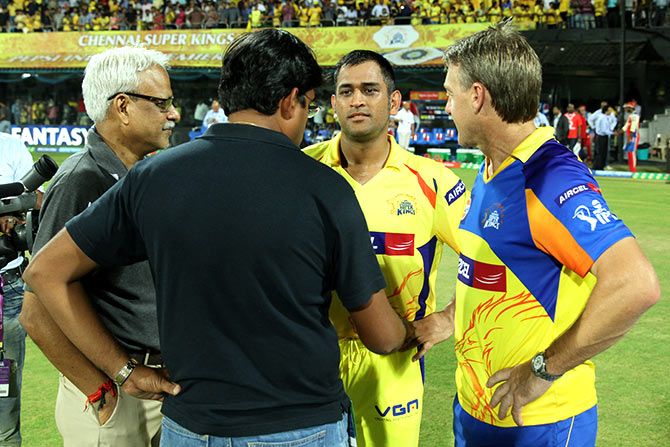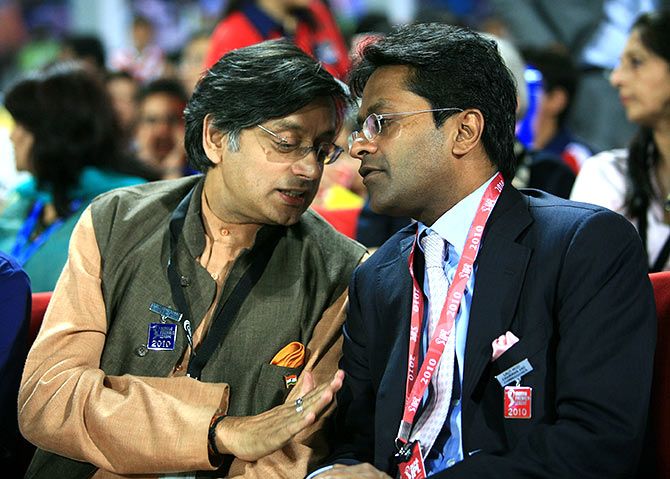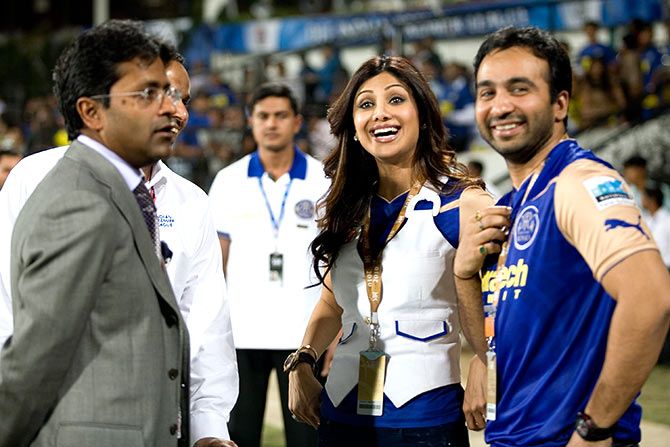Masterminded by the now suspended Lalit Modi, the IPL eventually succeeded in its endeavour. However, while the idea behind having such a tournament may have been good, the execution definitely wasn't.
Sadly, the Lodha panel verdict on the IPL spot-fixing scandal of 2013 can't guarantee such incidents won't happen in the future, says Bikash Mohapatra/Rediff.com.

The Lodha Committee verdict is out, and it is not good news for the Board of Control for Cricket in India.
The authoritarian cricket body, thus far not accountable to anyone, suddenly finds itself at the receiving end.
The panel, inter alia, has proposed two-year suspensions on Chennai Super Kings and Rajasthan Royals, the two finalists in the inaugural edition of the Indian Premier League.
Besides, it also recommended life suspensions on Chennai Super Kings official Gurunath Meiyappan and Rajasthan Royals's Raj Kundra from all cricket-related activities, the duo having been found guilty of illegal betting in the sixth edition of the tournament.
- Full text of the Justice Lodha IPL verdict
It is imperative here to mention that the Supreme Court had earlier made it clear that the panel's verdict will be binding on the BCCI.
In recent years, the BCCI, thanks to the limiting nature of cricket per se – the fact that it is a local, not a truly global sport, as also the fact that it is the biggest revenue aggregator for the International Cricket Council -- had become too powerful, almost dictatorial.
It claimed to be a private body that had its own set of rules, and as such not under the purview of any other authority or restriction.
At the same time it broke/amended all the existing rules to its advantage, much to the detriment of the game.
Not that it cared. For what really mattered to the powers that be was not the growth of the sport but how much money they made.
The IPL was a manifestation of this greed.
The idea of an eight-franchise T20 tournament, the Indian Cricket League, was first mooted by Subhash Chandra of Zee Network in 2007-08. Sensing opposition, and consequent defection (of high-profile players), the BCCI tried every means to sabotage the ICL.
Masterminded by the now suspended Lalit Modi, the IPL eventually succeeded in its endeavour.
While the idea behind having such a tournament may have been good, the execution definitely wasn’t.

From inception itself, despite having the ICC's sanction, it lacked a legal framework. Rules were flouted at will, whether it was regarding the number of franchisees, the ownership of the same, the auction of players or for that matter the results.
Consequently, there were controversies galore. One, surrounding the ownership of the now defunct Kochi Tuskers, forced the then Minister of State for External Affairs, Shashi Tharoor, to resign.
Another led to the dissolution of the Deccan Chargers, the franchise that won the second edition.
A third was triggered when the Union government gave away potentially substantial revenue by granting (entertainment tax) exemption to the ICC.
Yet another controversy ensured the suspension of the then chairman, Modi. The gentleman has since fled the country and frequently takes to a micro-blogging site to attack the BCCI.
Moreover, in all the five years since his escape, he has done well to generate one controversy or the other, the latest involving External Affairs minister Sushma Swaraj and Rajasthan Chief Minister Vasundhara Raje.
Finally, we have the mother of all controversies, the spot-fixing scandal of 2013, one that has had multiple implications including Tuesday's Lodha panel verdict.
All these controversies have not just brought disrepute to what is still labelled the gentleman's game. They have caused irreparable damage.

For a game that is not played in two-thirds of the globe, it was sacrosanct to maintain its dignity in countries where it is played. Sadly, that hasn't happened.
Aware that the game isn't growing, and the next generations may not take to the sport at all, the ICC (led by the BCCI) has opted for a policy of making hay while the sun shines.
So we have the same countries playing each other far more frequently than they used to and useless T20 competitions like the Champions League T20, BPL etc mushrooming. There is an excess for sure, but who cares so long as the money keeps coming in?
Mind you, things like match-fixing, spot-fixing and change of schedule are much easier in a game as limited as cricket. That's precisely what’s happening, and will happen.
The Lodha panel verdict does come as a relief. However, what it can't guarantee is that such incidents won't happen in the future.
Amid all this it is the fan who inevitably turns a blind eye to the dark realities that have permeated into the game, and who suffers the most.
Truth be told, they deserve it!












 © 2025
© 2025